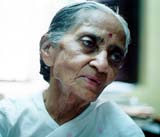'The joy of Independence was dampened
by the partition of the country'
What prompted you to join the freedom movement?
 I do not think I should be given credit alone. No one could resist
participating in the freedom struggle. It was because of Gandhiji
and the atmosphere that was created in the country that we participated
so enthusiastically. It was almost electrifying.
I do not think I should be given credit alone. No one could resist
participating in the freedom struggle. It was because of Gandhiji
and the atmosphere that was created in the country that we participated
so enthusiastically. It was almost electrifying.
I first became aware of the movement when I was around seven or eight
year old. Actually there was hardly any child who wasn't affected.
As we didn't have a party of our own, the children formed a vanar
sena (army of monkeys), and were prepared to lay down their
lives for their leaders. We were told not to use violence at all.
Slogans were our only weapons.
I still remember how we used to go from house to house selling
khadi, carrying it on our shoulders. Picketing liquor shops--
asking people not to drink. Our struggle was essentially a moral
struggle -- a struggle to reinstate values. It was not a struggle
to merely win political freedom. And this is what made it unique.
I remember once we had taken out a procession. It was a mile long
procession and we were shouting
slogans like 'Inquilab Zindabad, Long Live Gandhi.'
Meanwhile there was a lathicharge and a girl from our volunteer
group fell and became unconscious.
The flag also fell from her hand. We were very unhappy. Not only
because Sarla was unconscious but because the flag had fallen.
So we asked our leaders to show us some way out. When they couldn't
do anything, we said told them now we would give the orders and
they would follow. They agreed.
We then got khadi shops opened in the middle of the night,
sat down on the streets with our aunts, mothers and grandmothers
and stitched uniforms. Next morning we took out a procession again
- but without flags. Our clothes contained the three colours of
the flag -white, green and red. We wore white chunnis (veils),
green blouses and white petticoats. We went to the police station
and told them, 'Ae policewalloh, chalao lathi, chalao danda;
jhuk na sakega apna jhanda. (Policemen, you can wield your
sticks and your batons but you cannot bring down our flag).
What was your finest moment in this great struggle?
My finest moment was when I was arrested broadcasting on the Congress
radio. It was also my saddest moment because our own technician
had betrayed us and informed the police. We were very proud of
our station and the police wouldn't have known if it was not for
his betrayal.
Secondly, when a special case was made against us. We, the five
accused, had to appear in the witness box. The first question I
was asked was whether I was present at the broadcasting station.
I replied, 'My lord, if it is not compulsory for me to answer
your questions, I do not want to answer it.'
 I did not want to tell a lie and save myself. The judge complimented
me for taking that stand and I was sentenced to four years imprisonment.
I did not want to tell a lie and save myself. The judge complimented
me for taking that stand and I was sentenced to four years imprisonment.
To tell you the truth, the joy of Independence was dampened by
the partition of the country. I got this news while recuperating
in Bombay because imprisonment had ruined my health completely.
I did not even feel like going for the flag salutation but I heard
Nehruji's speech.
Today after so many years we do not feel enthused about it at
all. Ours is a generation which is getting extinct but till the
end I would like to do whatever I can. We still have to build
this country. First it was Desh ko bachao, now it is desh ko
banao. (Save the nation, now it is to build the nation).
|

